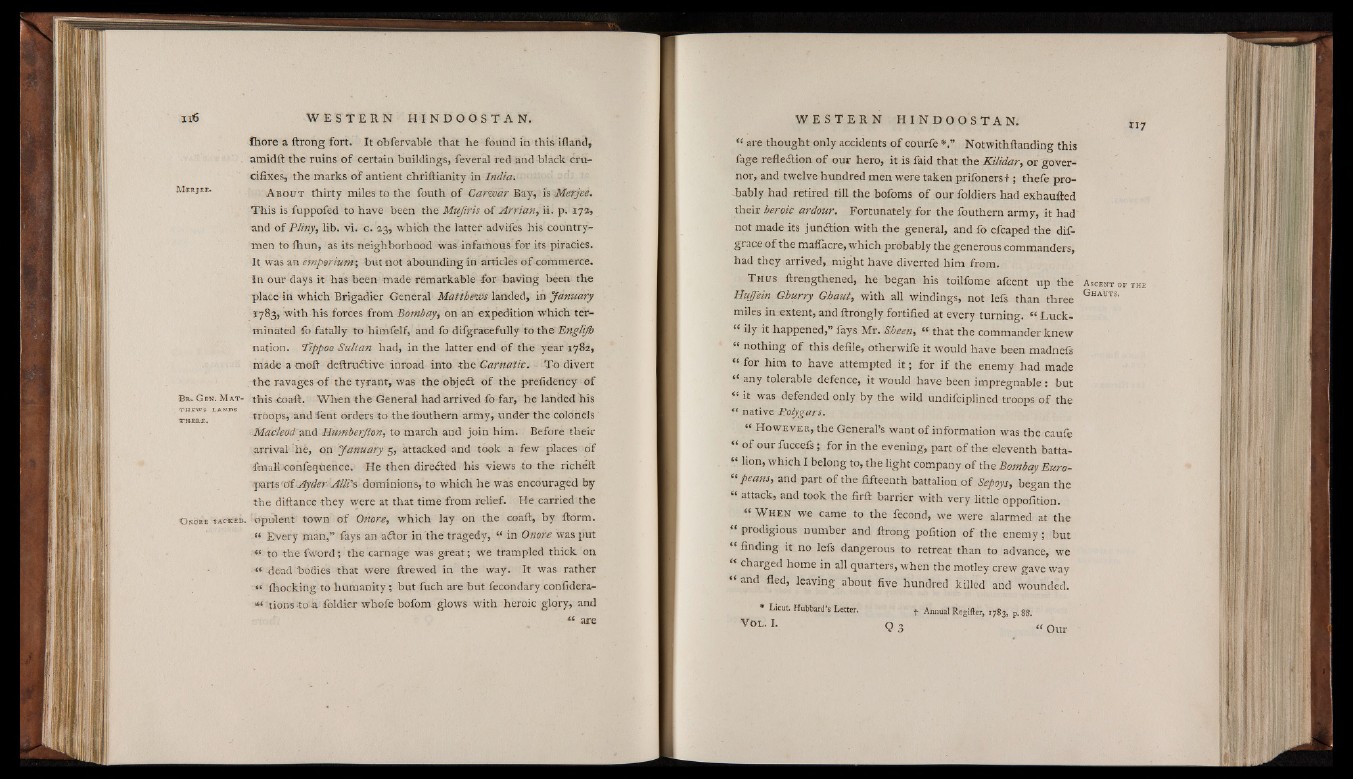
ihore a ftrong fort. It obfervable that he found in this ifland,
amidft the ruins of certain buildings, feveral red and black crucifixes,
the marks of antient chriftianity in India.
M e r j e e . A b ou t thirty miles to the fouth o f Carwar Bay, is Merjee.
This is fuppofed to have been the Mujiris o f Arrian, ii. p. 17s,
and of Pliny, lib. vi. c. 23, which the latter advifes his countrymen
to ihun, as its neighborhood was infamous for its piracies.
It was an emporium ; but not abounding in articles o f commerce.
In our days it has heen made remarkable for having been the
place in which Brigadier General Matthews landed, in January
1783, with his forces from Bombay, on an expedition which terminated
fo fatally to hlmfelf, and fo difgracefully to the Englijh
nation. Tippoo Sultan had, in the latter end of the year 1782,
made a moil deftmdlive inroad into the Carnatic. To divert
the ravages o f the tyrant, was the objeit o f the prefidency of
B r . G e n . M a t - this coaft. When the General had arrived fo far, he landed his
t h « T e . ^ * troops, and 'fent orders to the fouthern army, under the colonels
Macleod“and Humberjlon, to march and join him. Before their
arrival he, on January 5, attacked and took a few places of
imalbconfequence. He then directed his views to the richeft
■parts'dfAyderAIK’S dominions, to which he was encouraged by
the diftance they were at that time from relief. He carried the
O s o r e e a c k e d . opulent town off Onore, which lay on the coaft, by ftorm.
“ Every man,” fays an atftor in the tragedy, “ in Onore was put
“ to the fw'ord; the carnage was great; we trampled thick on
“ dead bodies that were ftrewed in the way. It was rather
« {hocking to humanity; but fuch are but fecondary confidera-
tions to a foldier whofe bofom glows with heroic glory, and
“ are
“ are thought only accidents o f courfe Notwithftanding this
fage reflection o f our hero, it is faid that the Kilidar, or governor,
and twelve hundred men were taken prifonersf ; thefe probably
had retired till the bofoms o f our foldiers had exhaufted
their heroic ardour. Fortunately for the fouthern army, it had
not made its junction with the general, and fo efcaped the dif-
grace o f the maffacre, which probably the generous commanders,
had they arrived, might have diverted him from.
T hus ftrengthened, he began his toilfome afcent up the*
HuJJein Ghurry Ghaut, with all windings, not lefs than three
miles in extent, and ftrongly fortified at every turning. “ Luck-
“ ily it happened,” fays Mr. Sheen, u that the commander knew
nothing o f this defile, otherwife it would have been madnefs
i for him to have attempted i t ; for i f the enemy had made
ii any tolerable defence, it would have been impregnable : but
“ it was defended only by the wild undifciplined troops o f the
“ native Polygars.
“ H ow e v e r , the General’s want of information was the caufe
“ o f our fuccefs; for in the evening, part of the eleventh batta-
“ lion> which I belong to, the light company of the Bombay Euro-
“ peans, and part of the fifteenth battalion of Sepoys, began the
“ attack, and took the firft barrier tvith very little oppofition.
“ W h e n we came to the fecond, we were alarmed at the
“ prodigious number and ftrong pofition o f the e n em y ; bu t
finding it no lefs dangerous to retreat than to advance, we
H charged home in all quarters, when the motley crew ga ve way
“ and fled, leaving about fiv e hundred killed and wounded.
A s c e n t o f t h e
G h a u t s .
* Lieut. Hubbard’s Letter.
V o l . I.
t Annual Regifter, 1783, p. 88.
Q 3 i Our